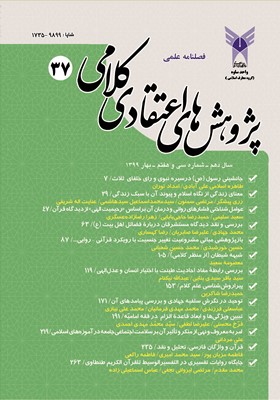جانشینی رسول (ص) درسیره نبوی و رای خلفای ثلاث
محورهای موضوعی : کلام اسلامی
1 - 0
کلید واژه: رسول خدا(ص), خلافت, خلفای سه گانه, وصایت, بیعت,
چکیده مقاله :
پس از رحلت رسول خدا(صلی الله علیه و آله)، مساله ی خلافت، مهم ترین مساله مطرح در جامعه اسلامی بود. عده ای مدعی ابتناء این جانشینی بر نصب الهی بودند؛ در مقابل جریانات فکری دیگر آهنگ دیگری نواخته و طرح های دیگری درانداختند. پژوهش حاضر با با روش تحلیل و نقد متنی و تاریخ، کوشیده است به این سوال پاسخ دهد که رسول خدا (صلی الله علیه و آله) بر حسب گزاره های تاریخی_ روایی درباره خلافت چه آموزه هایی داشته اند؟ و خلفای سهگانه چه معیارهایی؟ نتایج حاصل از این پژوهش نشان دهنده ی این است که میان سیره ی رسول خدا(ص) و رای و عمل خلفای سه گانه درباره مساله ی خلافت تفاوت عمیق وجود دارد. رسول خدا(ص) مساله خلافت را به نص الهی دانسته، درحالی که خلفای سه گانه معیارههایی همچون بیعت، استخلاف و تعیین شورایی را برای مشروعیت بخشی به خلافت خود و یکدیگر در نظر گرفتند که بعدها نیز معیار عمل اهل سنت قرار گرفتند.
After the death of the Messenger of Allah (PBUH & HP), the issue of caliphate was the most important issue in Islamic society. Some claim that this succession was the basis of the divine installation; in addition to the intellectual currents, they sang another song and made other plans. The present research has attempted to answer the question with the historical-analytical method that the Prophet (pbuh), in terms of historical propositions, had a narrative view of the caliphate? What are the three caliphs? The results of this study indicate that there is a profound difference between the viewpoint of the Prophet (pbuh) and the three caliphs about the issue of caliphate. The Prophet (pbuh) considered the caliphate to be divine, while the three caliphs considered criteria such as allegiance, subordination, and council determination to legitimize their caliphate and each other, which later became the criterion of Sunni practice.
